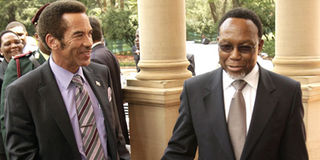Breaking News: At least 10 feared to have drowned in Makueni river
Uncertainty reigns over SADC's rescue plan for Zimbabwe

Botswana's President Seretse Khama Ian Khama (left), smiles as he is welcomed by South African President Kgalema Motlanthe for a summit at the presidential guest house in Pretoria, January 26, 2009. SADC meets in Swaziland next week to discuss a rescue package for the bankrupt southern African country with a question mark hanging over where they will find the money. Photo/REUTERS
What you need to know:
Besides South Africa, all SADC member states rely on donors for budgetary support and analysts doubt they will have anything to spare for Zimbabwe.
HARARE, Wednesday
Zimbabwe's neighbours meet in Swaziland next week to discuss a rescue package for the bankrupt southern African country with a question mark hanging over where they will find the money.
Since Zimbabwe's political rivals agreed to form a unity government last month it has become obvious that Western countries will not fund the country's reconstruction as long as President Robert Mugabe is still in charge.
This has been worsened by the resurgence of political violence and the push by President Mugabe's supporters to evict the few remaining white commercial farmers.
The United States this week said it was not in a hurry to lift sanctions imposed on the bankrupt country until it sees real signs of change in the way Mr Mugabe relates to his political opponents.
President Barack Obama's administration has said it would maintain the targeted sanctions on the 85 year-old leader's inner circle until he shows real signs that he is ready to reform.
The World Bank, the International Monetary Fund (IMF) and the European Union, already constrained by effects of the global recession, have also imposed tough conditions for the unity government before they can extend any aid.
The onus has fallen on the Southern African Development Community (SADC), which brokered the political deal that saw Mr Morgan Tsvangirai being inaugurated as Prime Minister on February 11, to mobilise the financial support.
Although Australia, Greece, Norway and Sweden have extended financial support to the new government in recent weeks, their donations are a drop in the ocean for a country struggling to feed seven million people and stop a cholera epidemic ravaging the cities and rural communities.
Any economic recovery for the country once regarded as a potential bread basket for Africa is predicated on a US$5 billion package that should be made available immediately for budgetary support and humanitarian assistance.
SADC has pledged US$2 billion for the country's reconstruction and the organisation will meet on March 30 to make a final decision on the package.
But besides South Africa, all SADC member states rely on donors for budgetary support and analysts doubt they will have anything to spare for Zimbabwe.
Botswana, another country which could have come to the coalitions rescue, is working hard to mitigate its budget deficit - the first in years - which is blamed on falling global mineral prices.
Although there is a lot of goodwill in the region to see this government succeed, there are no signs that there would be financial assistance for an economic turnaround at this stage, said Mr Nhamo Musengi, a Harare based economist.
Zimbabwe's neighbours will be very cautious because of the effects the global recession will have on their own economies and they will want to spend wisely.
The SADC heads of State would go through recommendations made by regional Finance ministers who met in South Africa in February to discuss a bailout package for Zimbabwe.
Mr George Mkhwananzi, a political analyst, said donors were still sceptical about Mr Mugabe's commitment to change.
Most of the Western donors are not prepared to start to allow resources to flow to the direction of Zimbabwe, obviously because there are a number of things that are still pending, Mr Mkhwananzi told the Voice of America radio.
President Robert Mugabe has not convincingly shown that he is committed to a truly equitable distribution of power and most of the things that he has done so far had to be pushed.
So there is no goodwill being exhibited by President Mugabe, which makes most of these donor countries unwilling and reluctant to immediately work with him in that regard.
Analysts also believe that in the end, South Africa will be forced to carry the burden of rescuing its neighbour because it is desperate see the unity government succeed.
Former South Africa President Thabo Mbeki was the mediator in the talks that resulted in President Robert Mugabe's Zanu PF and the two Movement for Democratic Change formations signing the September 15, 2008 power-sharing agreement.
His successor, President Kgalema Motlanthe, was also instrumental in persuading the parties to consummate the marriage.
South Africa will have to carry the burden, and in the end, the resources might not be enough to have the impact that is envisaged, said Mr Khulani Nkosi, a Bulawayo based analyst.
Last week, Mr Mugabe appealed to Zimbabwe's friends to come to the country's rescue when he launched an emergency economic recovery plan.




